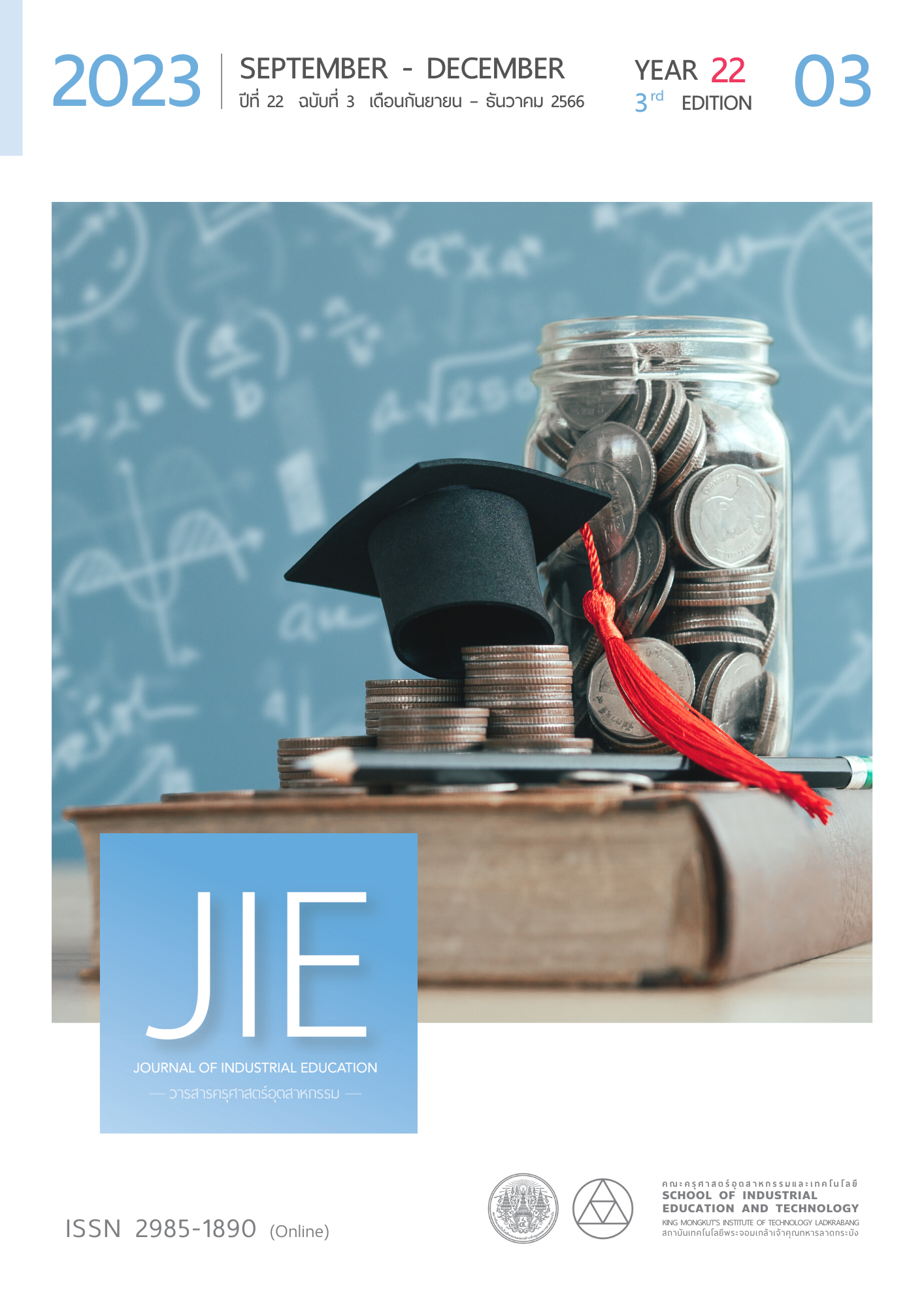THE DEVELOPMENT OF LEARNING MANAGEMENT ACTIVITIES BY APPLYING STEM EDUCATION TO PROMOTE THE SCIENTIFIC PROBLEM- SOLVING THINKING ABILITY OF MATHAYOMSUKSA 3 STUDENTS
Keywords:
Management of STEM education, The scientific problem-solving thinking proficiency, STEM education, SatisfactionAbstract
This research was conducted to design and develop an innovation by using Developmental research’s type I. This research is divided into two phases: development phase and evaluation phase, which this study is in phase 2. The instruments of the research consisted of 1) 6 lessons plans, 2) the scientific problem-solving thinking proficiency tests, and 3) a satisfaction questionnaire. Statistics used in analyzing the data were percentage, mean, and standard deviation. The sample group was 30 Mathayomsuksa 3 students studying in semester 1/2022 at one of a school in Kalasin Province. Data were collected through 1) 20 items of the scientific problem-solving thinking proficiency tests, and 2) 10 items of the satisfaction questionnaire. The results found that 1) the development of learning management activities by applying STEM education for Mathayomsuksa 3 students met the efficiency at 80.50/84.17, which higher than the set criteria of 80/80, 2) The scientific problem-solving thinking ability of Mathayomsuksa 3 students after learning by applying STEM education was 77.83, which higher than the 70 percent criteria, and 3) students’ satisfaction toward the learning activities by applying STEM education was at the highest level ( = 4.59, SD = 1.82).
References
Donhongpai, P. (2013). The effects of multimedia based on the inquiry process on substance around us on learning achievement and capability in solving scientific problems of pathomsuksa six students. Veridian E-Journal, Silpakorn University (Humanities, Social Sciences and arts), 6(1), 782-792. (in Thai)
Khamsmile, P., & Sranamkam, T. (2019). The Effects of Blended Learning with Stem Education to Enhance Science Problem Solving Thinking for Grade VIII Students. e-Journal of Education Studies, Burapha University, 1(5), 16-34. (in Thai)
Likert, R. (2017). The I mpact of Leadership Style on Middle Managers’ Motivation: A Study of the Ministry of Civil Aviation in Egypt. Journal of Business and Management Sciences. 2017, DOI: 10.12691/jbms-5-3-5, 100-107.
Munkham, S. (2004). Teaching Strategies for Problem-Solving Thinking. Bangkok: Printmaking. (in Thai)
Office of the Secretariat of the Council of Education. (2017). National Education Plan 2017–2036. Bangkok. https://www.stou.ac.th/Offices/Oaa/OaaOldPage/Professional/Train_Professional/oaaInfo/oaa/Dept/Dept04/webcur63/Rule_MUA/Plan_Inter2560-2579.pdf. (in Thai)
Panich, V. (2015). Ways to create learning for students in the 21st century. Walailak Journal of Learning Innovations, 1(2), 3-14.
Pitiporntapin, S. (2015). Learning Science and Society for the 21st Century. Samutprakan: Boss Printing. (in Thai)
Partnership for 21st Century Skills. (2015). 21st Century Learning Framework. [Online]. Retrieved January, 2023, from http://www.p21.org/our-work/p21-framework
Piaget, J. (1962). The Stage of The Intellectual Development of The Child. Thinking and Reasoning. The United of America: Penguin Book.
Singto, A. (2020). The development of stem education learningactivities to enhance problem solving thinking ability for mathayomsuksa 1. Journal of MCU Nakhondhat, 7(7), 387-398. (in Thai)
Thailand competitiveness enhancement program. Human Resource. Retrieved on Janyuary 2023. https://elibrary.tceb.or.th/getattachment/4d7d9a38-a4da-4582-8ec8-00bcd1d28ba2/6265.aspx. (in Thai)
Wangdee, L., & Bunterm, T. (2022). The effects of stem education learning management on problem-solving thinking ability and science achievement of mathayomsuksa 3 students. Journal of Graduate School Sakon Nakhon Rajabhat University, 19(86), 35-43. (in Thai)
Weir, J. J. (1974). Problem solving is everybody's problem. The Science Teacher, 41(4), 16-18.
Unkaew, S. (2018). STEM education. http://www.kids.ru.ac.th/document/KM/STEM_by_T.Somchaiunkeaw.pdf. (in Thai)
Richey, R. C., & Klein. J. D. (2007). Design and Development Research: Methods, Strategies, and Issues, Routledge, New York. https://doi.org/10.4324/9780203826034.
Vasquez, J. A., Sneider, C., and Comer, M. (2013). STEM lesson essentials integrating Science, technology, engineering, and mathematics. New Hampshire : Heinemann.
Downloads
Published
How to Cite
Issue
Section
License
Copyright (c) 2023 Journal of Industrial Education

This work is licensed under a Creative Commons Attribution-NonCommercial-NoDerivatives 4.0 International License.
"The opinions and contents including the words in papers are responsibility by the authors."
"ข้อคิดเห็น เนื้อหา รวมทั้งการใช้ภาษาในบทความถือเป็นความรับผิดชอบของผู้เขียน"



